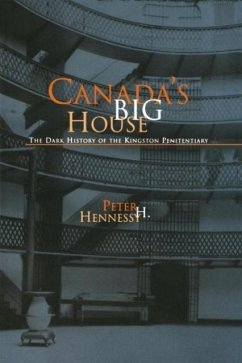A report in 1833 by a committee of three respected Kingston colonials called for the construction of a limestone penitentiary on Hatter's Bay to the west of the town. Their report contained these words of advice for its future governors: "...[shall] be a place by every means not cruel and not affecting the health of the offender, [but] shall be rendered so irksome and so terrible that during his lifetime he may dread nothing so much as a repetition of the punishment..." The obvious contradiction within this historical mandate of Canada's Big House has bedevilled the entire history of the jail. Its original high moral purpose - penitence through silent reflection - drifted away into the foggy realm of official myth almost as soon as the first convicts arrived in 1835. This semi-documentary study of the Kingston Penitentiary by a local writer and historian lays bare in cool prose the rapid descent from puritanical purpose to merely punitive management. For the first 75 years, repression was accepted as the norm, even applauded, by the local citizens, some of the inmates, and the political establishment. Over the last hundred years, repressive practices at Kingston Peneitentiary have been publicized, analyzed, and increasingly denounced. In the outcome, the Big House at Kingston has become almost unmanageable. What to do with it? The question still hangs in the air.
Hinweis: Dieser Artikel kann nur an eine deutsche Lieferadresse ausgeliefert werden.
Hinweis: Dieser Artikel kann nur an eine deutsche Lieferadresse ausgeliefert werden.








